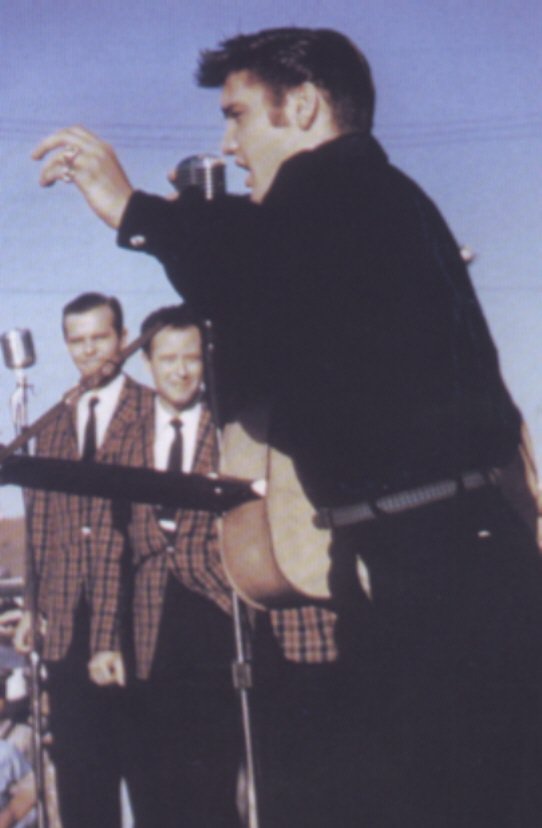 
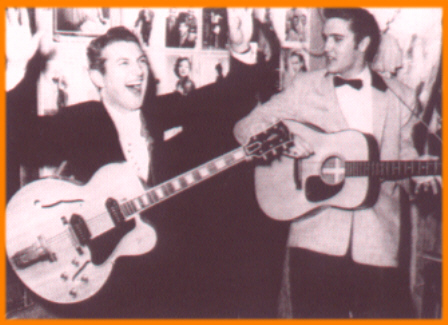
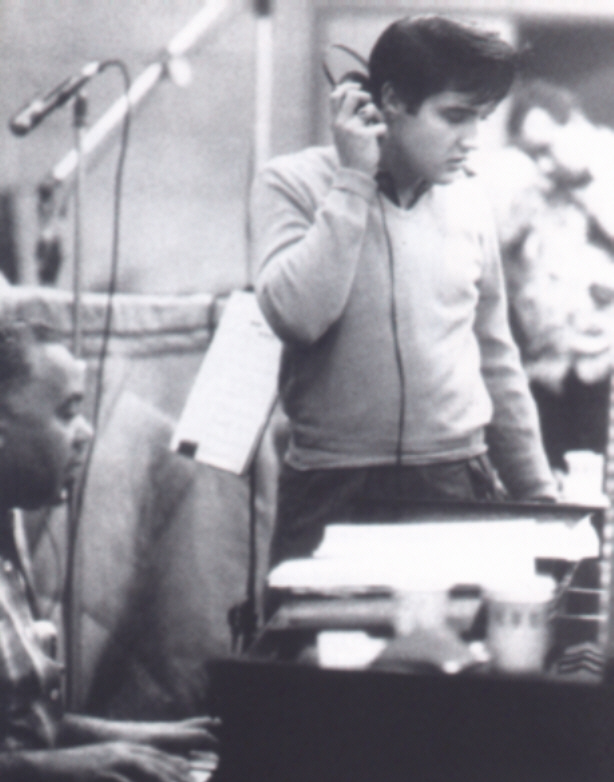
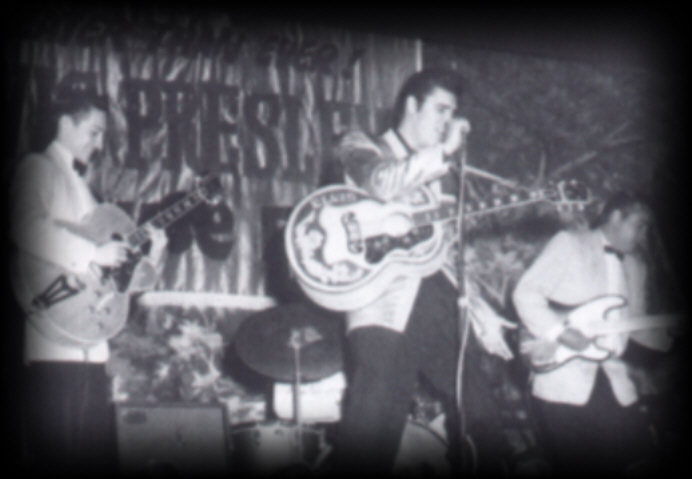
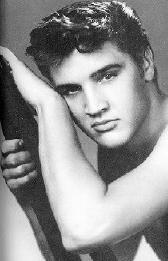
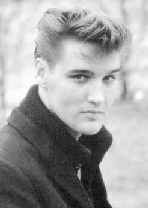

(Clic On Pics 2 Enlarge)
|
January
1955
Elvis signs a contract with Bob Neal, who becomes his
manager.
January
10, 1956
Two days after his twenty-first birthday, Elvis has his
first recording session for RCA, held at their studio in
Nashville. Among the songs laid to tape during this
session is "Heartbreak Hotel".
The Jordanaires, a gospel quartet and popular country
back-up group, begin working with Elvis in the studio
during the first few RCA sessions and would soon begin
touring with him. They would also appear with him in
several films. They would be his main back-up group until
the late sixties.
January 27, 1956
"Heartbreak Hotel" b/w "I Was the
One" is released by RCA and sells over 300,000
copies in its first three weeks on the market. It would
go to number one on Billboard's pop singles chart for
eight weeks and would also hit number one on the country
chart and number five on the R&B chart. It would
become the first Elvis single to sell over one million
copies, thus
becoming Elvis's very first gold record.
January 28, 1956
Elvis appears with Scotty, Bill, and D.J. on the Jackie
Gleason-produced "Stage Show", starring Tommy
and Jimmy Dorsey on CBS. This is Elvis's first network
television appearance. He appears on six weekly
"Stage Shows" in a row and makes minor waves
nationally. The last of these six "Stage Show"
appearances is March 24. Traveling and personal
appearances continue during this time, including the
"Louisiana Hayride" appearances for which he is
still under contract. Fame and "infamy" build.
February, 1956
As "Heartbreak Hotel" makes its climb up the
charts, "Mystery Train" b/w "I Forgot to
Remember to Forget", Elvis's fifth and last single
to be released on the Sun label, hits number one on
Billboard's national country singles chart. His first
number one hit on a national chart.
March 13, 1956
RCA releases "Elvis Presley", Elvis's first
album. (He had not released an album on Sun.) The album
would go to number on on Billboard's pop album chart for
ten weeks. It would become the first Elvis album to reach
over $1 million in sales, thus becoming Elvis's first
gold album.
April 1, 1956
Elvis has a screen test for Paramount Studios in
Hollywood. He lip syncs "Blue Suede Shoes" and
he performs a scene from the as yet unmade film,
"The Rainmaker", a film he did not end up being
in.
April 3, 1956
Elvis appears on "The Milton Berle Show" on
ABC, which, for this particular broadcast, originates
from the deck of the aircraft carrier, the USS Hancock.
April 6, 1956
Elvis signs a seven-year movie contract with Hal Wallis
and Paramount Pictures.
April 23 - May 9, 1956
Compared to the usual hysteria, Elvis has lukewarm
acceptance for his two-week engagement at the New
Frontier Hotel in Las
Vegas. He is not exactly what the adult audience of Vegas
gamblers relates to very well. During these two weeks,
the single
"Heartbreak Hotel" and the album "Elvis
Presley" both hit number one on the Billboard pop
charts.
Through all of this, the travel and personal appearances
around the country and new record releases continue. The
crowds get
bigger and bigger, wilder and wilder. Elvis's fame grows
dramatically Some shows have to end early due to fans'
storming the stage. Elvis creates pandemonium wherever he
goes.
June 5, 1956
Elvis appears again on "The Milton Berle Show",
this time in the studio where the show usually
originates, this time backed by the Jordanaires in
addition to Scotty, Bill and D.J. Among his selections is
a playfully sensuous, bump and grind performance of
"Hound Dog" that drives the kids in the
audience wild, and, the next day, has the press and some
of the adult viewers appalled.
It is one of his most controversial performances. This
merely serves to fuel his seemingly unstoppable
popularity even more.
Traveling and personal appearances and new record
releases continue. By this time Elvis, with his sexy
moves and black-influenced sound, is being condemned by
certain factions of the " morally concerned"
establishment and the religious community. But, the kids
love it.
July 1, 1956
Elvis appears on "The Steve Allen Show" on NBC.
Among his performances that night is a much toned down
version of "Hound Dog". Allen has Elvis dressed
in white tie and black tux with tails and has him sing
the song to a live Basset hound, a tongue-in-cheek
response to all controversy created by the Berle
appearance the month before. Elvis good-naturedly goes
along with it, but is not too happy about it.
Record releases, touring, and recording continue. The
condemnation and controversy continue along with the
ever-growing
popularity. Ed Sullivan, who had said that he would never
have the likes of Elvis Presley on his show, changes his
tune when he sees the big ratings that Elvis attracts to
the Berle and Allen shows. A three-appearance deal is
worked out for $50,000 and is the highest amount ever
paid to a performer, up to that time, for appearing on a
variety show.
August 1956
Elvis begins shooting his first movie, "Love Me
Tender" on loan-out from Paramount to Twentieth
Century Fox. It is originally titled "The Reno
Brothers", but is re-titled before its release to
capitalize on Elvis's sure-to-be-a-hit single from the
soundtrack.
September 9, 1956
Elvis makes the first of three appearances on Ed
Sullivan's "Toast of the Town Show", the top
television program of the era.
Elvis attracts the highest ratings ever for any
television variety show.
September 26, 1956
"Elvis Presley Day" is proclaimed in Tupelo,
Mississippi. Elvis's parents join him as he returns to
the town of his birth as a big star. He performs two
shows that day at the Mississippi-Alabama Fair and Dairy
Show, the same fair at which he had performed at age 10.
This time there are a hundred National Guardsmen
surrounding the stage to control the crowds of excited
fans.By this time, souvenir merchandising using Elvis's
name, image, and likeness has become a big part of the
Elvis phenomenon.
Licensees would soon be producing as many as thirty
different products including hats, t-shirts, jeans,
kerchiefs, sneakers, shirts, blouses, belts, purses,
billfolds, wallets, charm bracelets, necklaces,
magazines, gloves, bookends, a statue, lipstick, cologne,
stuffed hound dogs, stationery, sweaters, crockery, and
more. Elvis and the Colonel blazed new trails in the area
of celebrity merchandising. This would forever be part of
the marketing of Elvis Presley, feeding a never-ending
demand.
October 28, 1956
Elvis makes his second of three appearances on the
Sullivan show.
November 16, 1956
Elvis's first movie, "Love Me Tender" premieres
at the Paramount Theater in New York City, opening
nationwide in the days following. It becomes a smash hit,
and the critics' reviews aren't bad for his acting in
this melodrama, which is set in 1800's Civil War era
southern America. The film has Elvis performing several
songs, of course.
December
31, 1956
The front page of the Wall Street Journal reports that in
the past few months Elvis merchandise has grossed $22
million in sales.
Elvis ends the pivotal year of his career, when regional
popularity gave way to unprecedented national and
international fame.
The year of 1956 had seen the beginning of Elvis souvenir
merchandising, the beginning of a successful movie
career, history-making record sales (five number one
singles on the pop chart, two number one albums on the
pop chart, and other hits), history-making television
appearances, record-breaking personal appearances and
more.
Elvis had become the primary symbol of the new youth
culture in America. He had also become one of society's
most controversial figures. His unique blending of white
country and gospel music, black R&B and gospel music,
white pop music, and his particular brand of charisma and
talent, and the resulting success and controversy, had
him helping greatly to begin, without premeditation, a
cycle of change in music and pop culture and the mores of
American society. Nothing would ever be the same for
Elvis Presley or the world!
|
